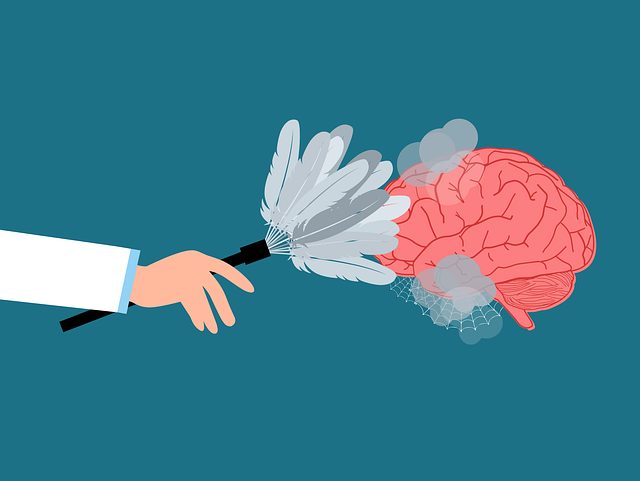Burnout among healthcare providers, especially in high-pressure specialties like Parker Trauma Therapy, is a growing concern impacting both personal well-being and patient care quality. Early signs include chronic fatigue, decreased job satisfaction, and emotional detachment. Effective prevention requires understanding contributing factors beyond workload intensity, such as lack of control, inadequate support systems, and unclear job expectations. Promoting emotional well-being through healthy coping mechanisms, open team communication, stress reduction practices, and Emotional Intelligence (EQ) can significantly mitigate burnout risk. Parker Trauma Therapy offers a comprehensive approach addressing emotional stressors, fostering resilience, and providing tailored self-care practices to create supportive work environments. A holistic approach combining EQ and mood management techniques is vital for long-term well-being, ensuring better patient care through sustainable provider well-being.
Healthcare provider burnout is a growing concern, impacting not only individuals but also patient care and system performance. This article explores comprehensive strategies to prevent and manage burnout among healthcare professionals. We delve into the signs and causes, highlighting the significance of recognizing and addressing this issue. One innovative approach, Parker Trauma Therapy, offers a unique perspective on burnout prevention. Additionally, we provide practical long-term strategies for healthcare organizations and practitioners to foster a healthier and more resilient workforce.
- Understanding Burnout: Recognizing the Signs and Causes in Healthcare Providers
- Parker Trauma Therapy: A Comprehensive Approach to Burnout Prevention
- Implementing Effective Strategies for Long-Term Burnout Management
Understanding Burnout: Recognizing the Signs and Causes in Healthcare Providers

Burnout among healthcare providers is a growing concern, impacting both individual well-being and patient care quality. Recognizing burnout early is crucial, as it often manifests subtley, with symptoms including chronic fatigue, decreased job satisfaction, and emotional detachment. Healthcare professionals, especially those in high-pressure fields like trauma therapy (Parker Trauma Therapy), may struggle to set boundaries due to a sense of duty or empathy, exacerbating these issues.
Understanding the causes is key to prevention. Beyond workload intensity, factors like lack of control over work processes, inadequate support systems, and unclear job expectations contribute significantly. Addressing these through strategies that promote emotional well-being promotion techniques and encourage self-esteem improvement can be transformative. For instance, establishing healthy coping mechanisms, fostering open communication within teams, and incorporating stress-reduction practices into daily routines are vital steps in mitigating burnout risk.
Parker Trauma Therapy: A Comprehensive Approach to Burnout Prevention

Burnout among healthcare providers is a growing concern, but innovative approaches like Parker Trauma Therapy offer a promising solution. This comprehensive approach focuses on addressing the emotional and psychological toll that healthcare professionals often experience. By integrating evidence-based techniques, it equips medical staff with essential tools to manage stress and prevent burnout. The therapy emphasizes creating a supportive work environment, fostering resilience, and promoting self-care practices tailored to each individual’s needs.
One key aspect of Parker Trauma Therapy is its emphasis on cultural competency training within healthcare settings. By recognizing the impact of diverse patient populations and their unique experiences, medical professionals can better understand and respond to their emotional needs. Coupled with effective risk management planning for mental health professionals, this approach ensures that providers are equipped to handle the challenges they face daily while prioritizing their well-being. Adopting Mind Over Matter principles further strengthens this strategy by empowering healthcare providers to reframe their mindset, fostering a sense of purpose and resilience in the face of stress and adversity.
Implementing Effective Strategies for Long-Term Burnout Management

In the ongoing quest to combat healthcare provider burnout, implementing effective strategies is paramount for long-term management. Beyond acute crisis intervention, such as Parker Trauma Therapy, a holistic approach integrating Emotional Intelligence (EQ) and mood management techniques proves instrumental in burnout prevention. Healthcare professionals equipped with EQ are better equipped to navigate complex interpersonal dynamics, manage stress, and foster resilient coping mechanisms—all crucial elements in mitigating burnout over time.
Burnout Prevention Strategies for Healthcare Providers must address the need for self-care, work-life balance, and supportive professional networks. Encouraging open communication, fostering a culture of compassion, and providing regular opportunities for emotional reflection can contribute significantly to long-lasting well-being. By integrating these practices into healthcare systems, we can create an environment that prioritizes provider mental health, ensuring sustainable care for patients in the future.
Burnout among healthcare providers is a pressing issue, but with the right strategies, it can be effectively managed and prevented. By recognizing the signs and understanding the causes, as outlined in this article, healthcare professionals can take proactive measures. Implementing long-term burnout management techniques, such as Parker Trauma Therapy, offers a comprehensive approach to fostering resilience and enhancing well-being. These strategies not only benefit individual providers but also contribute to improved patient care and organizational productivity.














